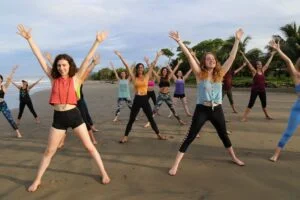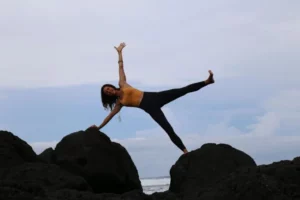How Yoga Granted Me Access Back Into My Life
by Christina Hennelly, Neurorehabilitation Therapist and Yoga Teacher
This is the story of how TBI transformed my life into something unrecognizable. It is also the story of how yoga for traumatic brain injury transformed my life once again and brought me to my dharma!
My Accident
For nearly 6 years after my accident in 2012, I anguished over the loss of my “old” self. I couldn’t let go of who I was before the accident. I was now a confused, tired version of my former self, with constant headaches, nausea and extreme balance issues. Prior to my accident, I was a successful, marketing executive at a large medical aesthetic firm. I had an active mom with a robust athletic life. After the accident, I had a hard time following conversations. I has trouble finding the words to say. Also, I couldn’t stay organized or remember anything. Mostly, I was too exhausted to get out of bed. It was a lingering, drawn-out journey.
The anxiety and frustration started right away. My mind chatter was unrelenting. I felt unworthy because I couldn’t keep up at work. Additionally, I experienced embarrassment not to have the energy to play with my son. I found myself completely humiliated as things started to unravel. Before long, I had to resign from the job I had been thriving at for over 10 years. I did so in order to save my last speck of dignity. My self-identity was shattered. I was riddled with thoughts of being unskilled and unemployable. This eventually led to me feeling that I wasn’t good enough at anything. I was desperate to have my old life back as I fell deeper and deeper into dejection. I knew I needed to do whatever it took to get my hope and inspiration back.
When I entered my first yoga class, I knew I had arrived!

No bated breath
I was terrified when I first started going to class. Would I have to explain to everyone I had a brain injury? Would people ask me how it happened? I was full of anxieties and apprehension. I didn’t want to talk about my experience. It was too triggering to talk about it especially in a place like a yoga class where I just wanted to forget. I didn’t want to fall or leave halfway because I was feeling “off”. I just wished to slip in, unnoticed and pretend that I was that able-bodied woman I once was. All these arbitrary fears zapped so much of my energy, that I finally told myself to just show up. So, I did exactly that. I humbly showed up as my authentic self!
Some days I stayed in Savasana pose the entire class, other days I was able to hit a strong warrior pose and then there were the times I cried. Every single day all I had to do was show up for myself, and that’s when I started to feel that piece inside of me that I lost in the accident coming back to life. I was accepting myself and forgiving life for my circumstances and I could finally look at myself in the mirror again. I started to recognize that person and learned to love myself all over again with all my imperfect purities. What I learned, is that the less expectations I put on myself, the greater my progress was overall.

Interpersonal connectedness in yoga for TBI
Surviving a brain injury causes enormous feelings of isolation (Donnelly, Linnea, Grant, & Lichtenstein, 2017). I felt like I didn’t belong anywhere, and when I did have the vigor to go out in a social setting, it was either too loud, too bright or I would suffer panic attacks. What was most difficult for me, was that most people had no clue that I was significantly immobilized. This pushed me even further into seclusion. Unlike a broken bone which requires a cast, there are no casts for a brain injury.
When I started yoga, I began to feel visible again for the first time since the accident. My light and sound sensitivity, my scattered thoughts and my slow pace, my emotional dysregulation; no one saw me as an accumulation of my symptoms, rather, I was a fellow yoga student. As I started to feel a sense of community, I suddenly stopped missing the job I once thought was so crucial to my identity – a new perspective about my life started to form. A re-established self-worth and appreciation for the life I still must enjoy.
Acceptance of my newborn talents through yoga for TBI
After just a few weeks the dark cloud started to pass and by 2 months of regular yoga and meditation practice, I noticed a difference in how I perceived my own abilities. I no longer ridiculed myself every time I took an hour longer to do something like writing an email or getting groceries. I appreciated the deep focus I was able to give to each moment and really listen to my surroundings. My inner voice and intuition flourished every time I allowed myself to fall or make a mistake. I tumbled many times in my beginner yoga classes, in fact I still take tumbles in class.
But each time I fell, a greater love for myself developed as I acknowledged the growth that came out of all the times I picked myself back up. These acts of courage and perseverance were all new to me and prior to my accident, I could have never been so brave. My daily practice of yoga and meditation allowed me to appreciate these new skills of self-kindness. Following this, my mood and energy levels were improving. My relationship with my son was closer than ever and my family and friends noticed the changes. The yoga allowed me to learn how to live in the present moment, listening to my body and my mind rather than catapulting myself from event to event.

What does the literature say about yoga for traumatic brain injury
When people have lost their identities as a result of their physical injuries, they can become extremely depressed and anxious. It is for this reason that the values and attitudes of yoga practice may help to stimulate hope, motivation and self esteem (Silveira & Smart, 2019).
Yoga integrates smoothly into a holistic neurorehabilitation plan. The outcomes of integrating yoga into the brain injury recovery plan has many benefits that are supported by the literature. As Silveira & Smart (2019) point out, contemplative practice refers to those practices that involve specific psychological processes such as: meta-awareness of one’s conscious processing; reappraisal of one’s beliefs and values; perspective-taking; self-schema development; and inquiry about the nature of one’s thoughts, emotions, perception, and awareness. Therefore, contemplative practices can give rise to structural and functional neuroplasticity, as well as enhancement of cognitive and emotional functioning, in persons with traumatic brain injury.
Adults living with traumatic brain injury, who practice regular yoga and/or meditation, experience improvements in overall quality-of-life and improvements in self-perception and decreased negative emotions (Donnelly, Linnea, Grant, & Lichtenstein, 2017).

Living presently in my best life
Today I live every day to the fullest, following my dreams. My brain injury allowed me to find yoga which has helped me re-establish life’s true purpose. I recently completed a 200 Hour Therapeutic Yoga Teacher Training program with Soma Yoga Institute that provided valuable tools in how to adapt my practice, strengthen, realign my body, and teach others. Earlier this year, I started full time studies pursuing my aspiration to complete my master’s in social work. Once I graduate, I will work as a Neuro Psychotherapist working with families and youth who have survived brain injury and I will include yoga as a complementary modality for both clients and caregivers.
I am currently working as a Neurorehabilition Therapist at a concussion clinic helping patients with their day-to-day survival of organizing their lives, and teaching mindfulness techniques for the overwhelming life transition. I teach a weekly customized yoga class using symbolized cue cards, chairs in addition to visiting survivors at the hospital to practice mindful movement at their hospital bed side if they can’t stand up.
Important Notes on Yoga for TBI
Much like a medication, everyone’s therapeutic yoga needs will be different. I select poses and sequences that match a client’s progress in their recovery. Forward folds are excellent to relieve anxiety. Back bends and heart openers are helpful at lifting symptoms of depression. Mental health disorders related to brain injury often disrupt the digestion system and sit in the gut so spinal twists are helpful for this area. Breathing techniques that stimulate the nervous system should be avoided for anxiety but can be helpful in progression sessions for depression. My own lived experience has allowed me to facilitate recovery in other’s lives in a way that is compassionate and authentic. I am a living example of how yoga for traumatic brain injury can grant people access back into their lives.